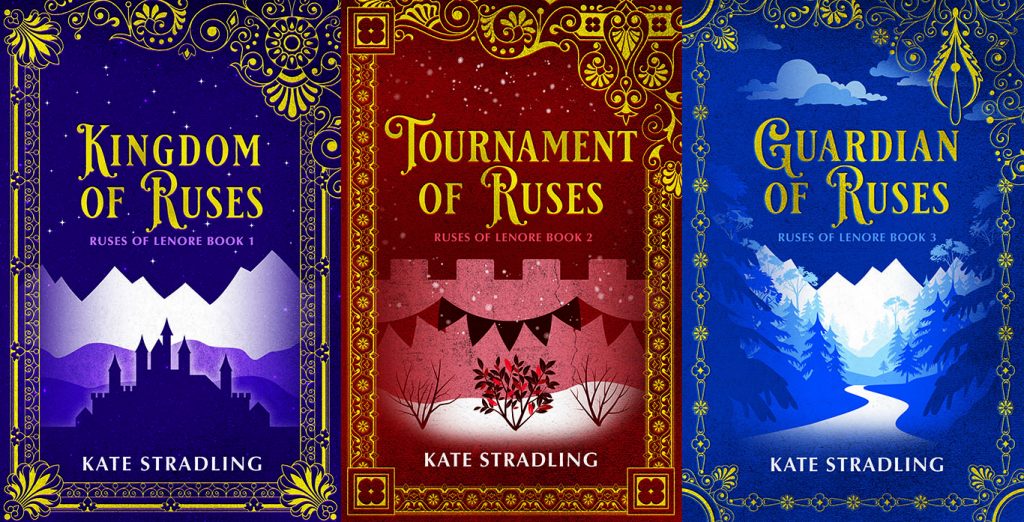
One of the frequent queries I get from readers, including for novels that bear every hallmark of a stand-alone, is “Will there be a sequel?” Usually the answer is no. As a writer, I have too many projects lurking in my brain to give them all the series treatment; as a reader, I prefer stand-alone books.
However, every so often, the answer is a tentative, “Maybe.” And sometimes, I even follow through.
With one of those happenstance sequels about to release (GUARDIAN OF RUSES drops November 1st!! /shamelessplug), I thought it would be fun to give my criteria for expanding on books originally framed as stand-alone tales.
And, as luck would have it, the RUSES OF LENORE series provides a decent example for how these criteria apply.
WARNING: there be Spoilers ahead for the first two books. If you haven’t read them, proceed at your own caution. (Or go read them and come back, haha.)
Criterion #1: Address open threads
I like my characters to exist beyond the confines of their stories, so some elements of their lives point outside the narrative. However, those threads don’t always merit an additional book. Sometimes they exist to fill out a character or setting rather than point to another plot.
Within the RUSES OF LENORE canon, these open threads exist:
Kingdom of Ruses
- After Viola bonds with the land, it commences a rapid recovery. What effects would this engage? (This question led to the main plot in TOURNAMENT OF RUSES.)
- Viola shows Will three cat’s-eye brooches and lets him pick one. What happened to the other two? (Rule of Three invoked; Flora receives cat’s-eye #2 in TOURNAMENT, but the existence of a third points to a third book. An unspecified number would have held no intrinsic narrative weight.)
- When Lenore kills an imperial governor, Melanthos does not retaliate. Why not? (This points to either weakness or internal conflict in the imperial court; it is not addressed in the first two books.)
Prince of Ruses (short story)
- The empire, because of its poor stewardship, is losing its vitality. What is Melanthos doing to counteract this consequence?
- The empire keeps a draconian watch over its magical resources, to the detriment of its citizens. Is Melanthos truly doomed? And what of all the people caught in failing lands by no fault of their own?
Tournament of Ruses
- The well of magic splits when it gets too powerful, and its first split happens within six months of Viola’s bond. How much more powerful will Lenore’s magic become? Who will the Morelands recruit as guardians to these new reservoirs? Does the split only happen when there’s a ready guardian waiting, or can it split off prematurely? How do these new reservoirs affect the forest creatures?
- When the shadow-shifters attack Flora, her reservoir doesn’t activate to defend her. The original reservoir didn’t activate for Viola until she was under bondage, either. If the forest allows predators and prey to exist (which it does), what laws govern its intervention? What different types of magical bonds exist, and what hierarchy of authority punishes a violation of those bonds?
Criterion #2: Explore new ground
A sequel that springs from a stand-alone risks retreading the same ground, and a watered-down version of the first book diminishes the value of both.
“New ground” doesn’t have to be literal scenery. It can be ideas or themes, a broadening or magnifying of established story elements. Regardless, I’ll focus on literal scenery here, because the world-building left me a lot of new ground.
- KINGDOM OF RUSES introduces the country of Lenore, a land bordered by the ocean to the west, with the empire of Melanthos looming beyond mountains and deep forest to the north.
- PRINCE OF RUSES allows a glimpse into a single village within Melanthos, with a reference to imperial soldiers in the area.
- TOURNAMENT OF RUSES delves into Lenore’s social scene: the pecking orders, parties, educational opportunities, etc. The story doesn’t venture outside the capital city walls, let alone into neighboring lands.
Therefore, much of the land’s geography remains unexplored, including
- the forest itself
- the nifaran village hidden somewhere within the forest
- the vastness of Melanthos
- the vaguely referenced “north countries” beyond the ridge of mountains that mark the empire’s western edge
Also unexplored:
- the capital city’s Midsummer’s Eve festivities (the midnight processional and fireworks; i.e., what the regular citizens are doing during the Prince’s ball)
- how Lenore’s people view the forest, whether it’s a land of nightmares or opportunities
- how they view the creatures of the forest and the people of Melanthos
Criterion #3: Adhere to thematic continuity
On the surface, KINGDOM and TOURNAMENT are very different books. One has an exterior plot, with outsiders coming into Lenore to cause trouble. The other has an internal plot, with its heroine establishing her place in an otherwise stable society.
However, some themes bind these two books together.
The land as a character.
In both books, the land itself plays a significant role. The people who live on it must take its preferences into account in their actions.
The creatures of the forest.
Because my original source of inspiration sprang from the whimsy of medieval bestiaries, magical creatures need to show up somewhere. In KINGDOM, I introduced the nifaran to fill this role, with cameos from many other established beasts. TOURNAMENT played with brownies and shadow-shifters in addition to the nifaran.
The journal entries.
These give direct insight to my main characters’ thoughts. They are not, however, always chronological to the story. Instead, the journal excerpts reflect events in the chapter they precede or the one they follow, sometimes with a touch of dramatic irony, sometimes to indicate a time skip, sometimes for a first-person reaction to a climactic event.
Any addition to this series has to consider these three elements (and more) to maintain continuity.
Criterion #4: Pique my personal interest
This one is tough to meet. Once my characters are out of crisis (the original story arc), I don’t like plunging them back in. Hence, the appeal of a stand-alone novel.
With the RUSES OF LENORE series, the personal interest for a third book came from two directions:
1. What kind of adult would Edmund Moreland become?
His scenes in KINGDOM and TOURNAMENT include him either ignoring calamity around him to focus on his own interests, or else creating mischief and then blithely running away. In addition,
- While Charlie and Viola were raised on a scarcity of magic, Edmund matures through a period of prosperity and growth.
- As the youngest child, he’s been babied but also left to his own devices.
- He comes from a long line of slippery characters and he has Will acting as a role model through his teenage years.
Once I figured out where all these influences pointed, I wanted to play with him on the pages of his own book.
2. How would someone loyal to Melanthos feel about Lenore?
I’ve long been fascinated with the power of alternate points of view. While a reader of the first two books in this series would recognize Lenore as a good place and Melanthos as a bad one, a character from the empire would feel the opposite. Thus Rosia Domitius, with her fierce loyalty, was born.
Using her as the focal point for a Limited Omniscient POV created opportunities for me to play with dramatic irony. The reader will know many things she doesn’t, so they’ll be able to piece together some mysteries before she does.
However, she also knows and behaves according to things the reader hasn’t yet learned. Unfolding that information piece-by-piece promised a fun and interesting exercise for me.

The stand-alone series?
When I first published KINGDOM in 2012, I considered it a stand-alone even though I’d already drafted a second book. TOURNAMENT (2014) has many stand-alone elements as well, so the pair can easily be read out of order.
GUARDIAN OF RUSES, in drawing upon both of these books for its inspiration, is less stand-alone and more firmly series-dependent. I was, perhaps, a bit self-indulgent with callback elements, but that’s part of the fun. While I wrote the first two books for their own sakes, this third is more of a nod to those readers who love this particular world of mine.
Myself included, as it turns out.
While I won’t reveal what from the above criteria actually made it into this third installment, if you want it delivered at the stroke of midnight on release day, you can pre-order GUARDIAN OF RUSES right HERE.
In the meantime, what expectations do you think a sequel should meet? What additional criteria, if any, should an author consider?